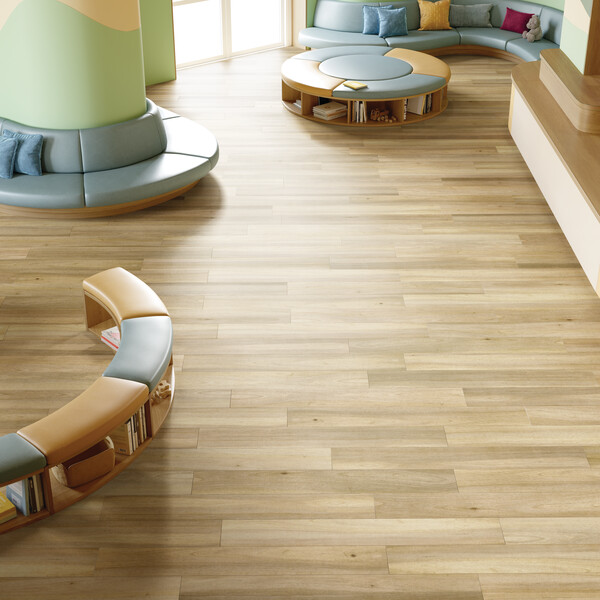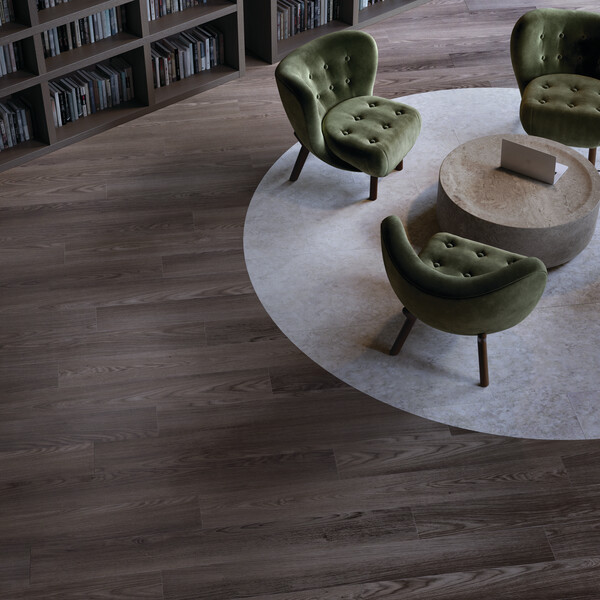Defining LVT Durability – Performance Benchmarks That Matter
Luxury vinyl tile (LVT) is a top choice in commercial spaces, and for good reason. It delivers high-end looks, low maintenance, and durability that match real-world wear and tear.
In high-traffic areas, LVT flooring must not only look good but also perform effectively over time. Here’s what defines LVT durability and how to identify luxury vinyl tile that performs long after installation.

Impact Resistance: Built to Take a Hit
In busy commercial environments, flooring faces more than just foot traffic. Dropped tools, carts, and equipment can cause severe damage if the floor can’t withstand sudden force.
Gardner Impact Test (ASTM D5420) is the standard for resilient flooring. It uses a falling dart to simulate real-world impacts and check for surface cracking or fracture.
Impact Resistance Test
| Test | What It Measures | What’s Considered Good |
| ASTM D5420 | Simulates a sudden impact using a falling dart | Pass = No surface cracking under standard or elevated drop heights |
Static and Rolling Load: Holding Up Under Pressure
Commercial spaces aren’t just busy with foot traffic. They must support heavy equipment, often used for moving items from one location to another. From bookshelves to medical equipment, LVT flooring must resist pressure from both stationary and moving objects.
- Static loads cause denting that can ruin appearance and function.
- Rolling loads test the floor’s ability to handle movement without joint failure or compression.
Here’s how durability is tested and what “good” looks like:
Static & Rolling Load Tests
| Test | What It Measures | What’s Considered Good |
| ASTM F970 (Static Load Limit) | Measures residual indentation from constant pressure (e.g., furniture legs) | ≥ 1000 psi is solid; 3000+ is top-tier |
| ASTM F2753 (Rolling Load) | Tests structural integrity under rolling weight (e.g., beds, carts) | Pass = No surface failure under 1,000+ lbs rolling loads |

Wear Layer: The First Line of Defense
The wear layer is the protective surface guarding LVT against scratches, scuffs, and surface wear. In high-traffic commercial spaces, it’s one of the most significant factors in long-term floor durability.
The wear layer’s thickness matters, but its quality matters more. A thicker wear layer generally means better protection. However, the coating technology (urethane, ceramic bead, aluminum oxide) also plays a significant role in resisting abrasion and maintaining appearance.
Wear Layer Thickness Recommendations
| Wear Layer Thickness | Typical Use | Performance Notes |
| 6 mil (0.15 mm) | Light residential | Too thin for commercial use; wears quickly |
| 12 mil (0.3 mm) | Light commercial, multifamily | Acceptable for lower-traffic commercial spaces |
| 20 mil (0.5 mm) | Standard commercial, healthcare, education | Industry standard for durability in most commercial environments |
| 28–40 mil (0.7–1.0 mm) | Heavy commercial | Best-in-class performance; holds up under heavy traffic and wear |
Tip: Don’t just ask about the thickness of a vinyl floor — ask about finish technology. High-performance LVT uses commercial-grade urethane coatings enhanced with ceramic or aluminum oxide. Those finishes extend the floor’s life and resist micro-scratches.
Water Resistance: For Everyday Spills and More
One of LVT’s most significant advantages is its resistance to water and moisture. Whether it’s routine mopping, spills, or humidity fluctuations, quality LVT should never swell, cup, or delaminate.
There isn’t a single universal test for “water resistance” in LVT, but performance is often assessed through:
Water Resistance Tests
| Test | What It Measures | What’s Considered Good |
| ASTM F3261 Section 8.8 | ||
| ASTM F925 | Chemical resistance, including water and cleaning agents | No discoloration, fading, or damage when exposed to water and standard cleaners |
| Manufacturer Simulated Flood Testing | Water exposure over time | Top LVT products maintain structural integrity and appearance after 24–72 hours of submersion or prolonged contact. |
What to look for with LVT durability:
- Waterproof core construction (e.g., SPC or WPC)
- Sealed edges and coatings to prevent seepage
- Welded seams or tight locking systems in installations to block water ingress
Dimensional Stability: Staying Flat and Locked In
Dimensional stability refers to a flooring product’s ability to maintain its shape under varying conditions, including heat, moisture, or prolonged exposure. Poor stability leads to gapping, curling, or buckling at the seams, which causes both aesthetic and functional issues.
Dimensional Stability Test
| Test | What It Measures | What’s Considered Good |
| ASTM F2199 | Change in dimensions (length/width) when exposed to heat | ≤ 0.25% dimensional change is considered stable and suitable for commercial installations |
Installation matters too. Even the most dimensionally stable LVT needs proper subfloor prep, acclimation, and moisture control. But high-quality LVT minimizes movement even when environmental conditions fluctuate.

Spotlight on Durability: Most Durable LVT Flooring
If you’re looking for a premier LVT flooring option that sets the bar for durability, Nod to Nature™ USA delivers. Engineered for demanding commercial environments, it offers:
- Exceptional static and dynamic indent resistance
- Less than 2% residual indent — meaning it bounces back fast after pressure
- Over 3000 psi static load resistance, far exceeding industry benchmarks
Nod to Nature USA meets real-world demands while offering authentic wood visuals and a warm, biophilic aesthetic. It combines strength, resilience, and design flexibility in one of the most durable LVT floors on the market.
The Bottom Line on LVT Durability
Luxury vinyl durability isn’t just about surface looks — it’s about how flooring holds up after years of traffic, pressure, and wear. Look beyond aesthetics to impact resistance, wear layer quality, and load performance.
Use this chart as a reference point:
LVT Durability Benchmarks
| Performance Area | Test Standard | What to Look For |
| Impact Resistance | ASTM D5420 | No surface cracking under impact |
| Static Load Resistance | ASTM F970 | ≥ 1000 psi (3000+ psi = excellent) |
| Rolling Load Resistance | ASTM F2753 | No surface failure under 1,000+ lbs |
| Wear Layer Thickness | N/A (Industry Benchmarks) | 20 mil for standard, 28–40 mil for heavy use |
| Water Resistance | ASTM F925, Simulated Flood Testing | No swelling, delamination, or discoloration |
| Dimensional Stability | ASTM F2199 | ≤ 0.25% dimensional change |
Ready to specify LVT built for performance? Contact your local AHF Contract rep to learn more about Nod to Nature™ USA or request a sample.
